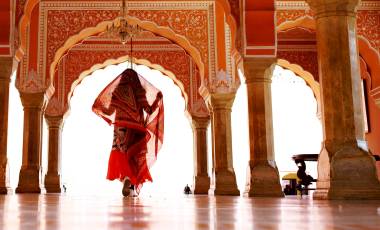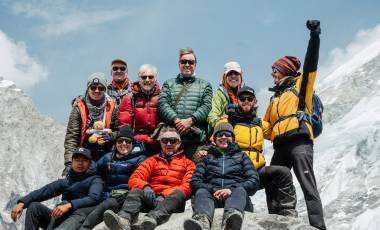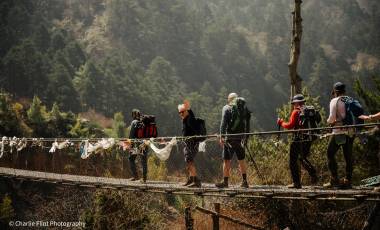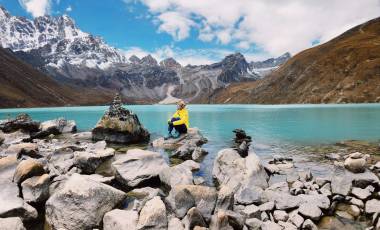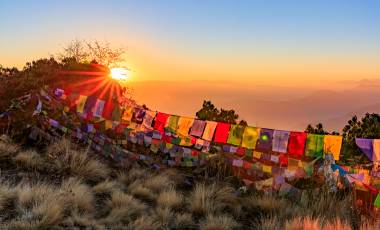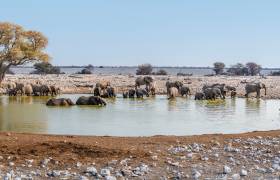Read time – 5 minutes
News of April’s earthquake in Nepal hit everyone at Exodus very hard. We have a long history with this mountain kingdom, over forty years, and few were more devastated than our Managing Director Peter Burrell.
Pete makes little secret of the fact that the Himalayas are his favourite place on Earth.
Indeed it was during his time trekking through these sky-scraping peaks that he decided to change his life and begin a career with Exodus. Now, almost five months after the earthquake struck, Pete reflects on the incredible reaction to our Emergency Earthquake Appeal and shares his thoughts on how best to help Nepal rebuild its future.
Rebuilding Nepal
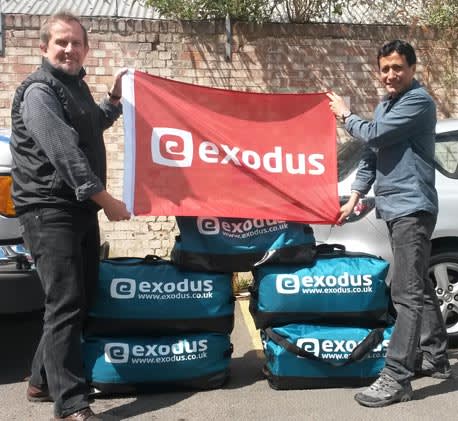 Exodus MD Pete and Customer Operations Exec Niraj preparing to send emergency aid to Nepal
Exodus MD Pete and Customer Operations Exec Niraj preparing to send emergency aid to NepalExodus immediately set up an emergency appeal fund for Nepal – a country that obviously holds a very special place in your heart. How successful has it been?
“Amazingly successful. We currently have over £225,000 (over £268,000 including GiftAid) raised by over 3500 individual donors. This is a phenomenal outcome and one that has humbled all at Exodus.
In those early hours immediately after the quake, we quickly decided we needed to help and pledged £15,000 and hoped to double that with donations. We passed that total in the first 36 hours. The most pleasing part was the obvious warmth and care shown by so many donors in their comments about their visits to Nepal and the kindness and helpfulness of our Nepali staff, and other local people. We pledged to make sure every penny donated would be spent delivering direct help in Nepal.”
You travelled to Nepal soon after the earthquake had struck. What was the motivation for your trip and what actions did you take initially upon your arrival in Nepal?
“Firstly, Nepal is a very special place for me. It is where I got the travel bug many years ago and I ended up trekking to Everest Base Camp in the early eighties. Since then I have been utterly spellbound by those magnificent mountains and the Nepalese people I am now lucky enough to regard as friends. I, therefore, could not just sit back as this horrible event unfolded, I had to get involved.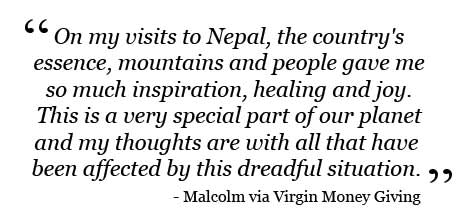 “By the time I arrived in Kathmandu, we had already ensured all of our passengers had returned home safely. My first task, therefore, was to meet our team and get their feedback on the situation, including the safety of their families, damage to their properties and reports from the main trekking areas. It was then a question of what to do next.
“By the time I arrived in Kathmandu, we had already ensured all of our passengers had returned home safely. My first task, therefore, was to meet our team and get their feedback on the situation, including the safety of their families, damage to their properties and reports from the main trekking areas. It was then a question of what to do next.
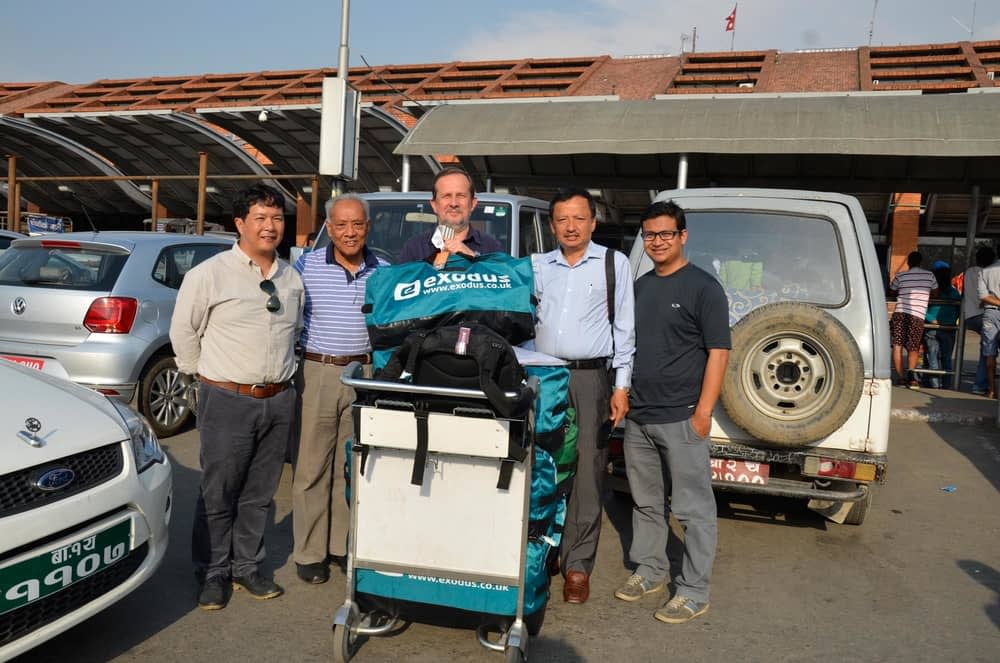 Pete arrives in Kathmandu with several kit bags full of emergency supplies
Pete arrives in Kathmandu with several kit bags full of emergency supplies“It was clear the earthquake had hit some areas harder than others. Big governmental and international aid agencies were swinging into action to help the areas around the epicentre and the major populated regions.
Assessing the situation, we quickly developed a three-stage plan. The most pressing need was to get emergency relief to some of the more remote villages. Not necessarily those furthest from Kathmandu but those that had been passed by the bigger agencies, and particularly those where our staff members came from.
We were in a perfect position to deliver this aid directly to those that needed it most. This initial phase mostly involved handing out large quantities of tin roofing panels and 1,920 tarpaulins for shelter from the threatening monsoon rains. Numerous trekking tents and sleeping mattresses were also supplied, as well as emergency food supplies to replace those buried under the rubble.
In order to stabilise basic health conditions, simple medicinal and hygiene products were also provided. In total, we spent in excess of £60k on phase one.”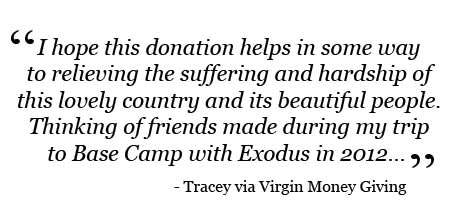 After providing initial emergency relief in the form of food, basic shelter and medical supplies back in May, how does Exodus plan to spend the remaining funds raised?
After providing initial emergency relief in the form of food, basic shelter and medical supplies back in May, how does Exodus plan to spend the remaining funds raised?
“Our second phase will start in earnest after the monsoon rains have abated. Valerie Parkinson, our long-serving trek leader and base manager in Kathmandu, is going to be overseeing this process from October onwards.
We have identified the villages and houses that need further repair to ensure they offer adequate longer-term protection from both the cold winters and wet summers to come. Each house will be checked both before and after any work is completed to ensure the money so kindly donated is being spent correctly. We hope to have this phase completed by the end of the year. “Due to the phenomenal amount of money raised by our appeal, we will also be able to continue to support the ongoing work of our Himalayan Community Projects in Nepal. This will include rebuilding schools and other damaged community buildings, ensuring water supplies are repaired and kitting outhouses with healthier, energy-saving smokeless stoves.
“Due to the phenomenal amount of money raised by our appeal, we will also be able to continue to support the ongoing work of our Himalayan Community Projects in Nepal. This will include rebuilding schools and other damaged community buildings, ensuring water supplies are repaired and kitting outhouses with healthier, energy-saving smokeless stoves.
Lastly, we are in discussions with a group of Nepali doctors to sponsor a trial “medical camp” where a temporary mini-hospital will be set up in a remote village and free medical help – including some surgical procedures – can be offered to those who would otherwise have no hope of receiving it.”
What are your hopes and visions for Nepal’s future?
“The most important issue in Nepal now is to ensure the return of tourism. It is a fantastic effort by all the aid agencies along with companies like us, but in the long term, Nepal needs a thriving economy to rebuild and improve its infrastructure and healthcare.
Currently, the UK advice is that you can safely visit Kathmandu, Pokhara, the middle hills and the Terai, but not the high mountain areas and particularly not the Everest region. I believe everyone agrees that during the monsoon season there could be an increased risk of landslides as the rains dislodge ground disturbed by the quake, but this advice needs lifting now before the country misses out on its key winter trekking season.
Yes, there is always the threat of another earthquake but this might be years or even centuries away, and you could easily say that about California, Northern Turkey, Japan and many other parts of the world. Nepal is one of the world’s very best adventurous tourist destinations and it needs a thriving tourism industry to survive and prosper.
The guides are ready, the porters are ready, and we have a long list of clients craving to go back.”
Watch our video of Exodus Managing Director Pete Burrell talk about his love of the Himalaya here.
Learn more about Nepal with our trips below.
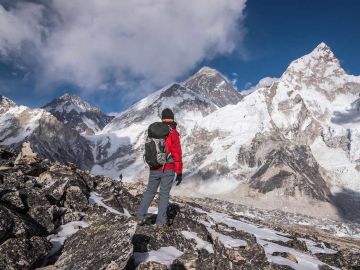
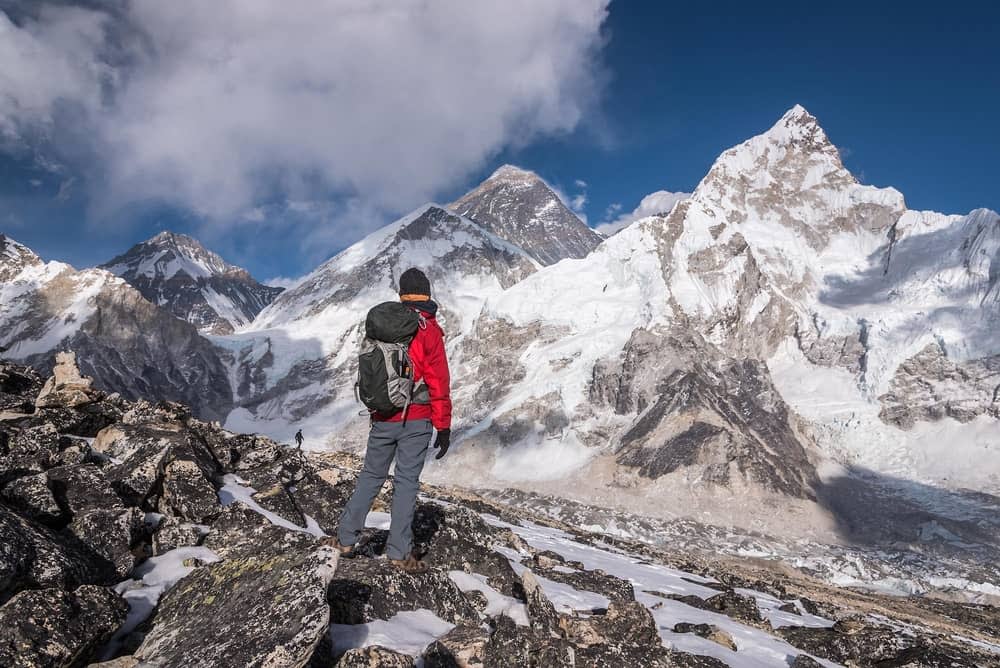 Trekker enjoying breathtaking views of Everest
Trekker enjoying breathtaking views of Everest